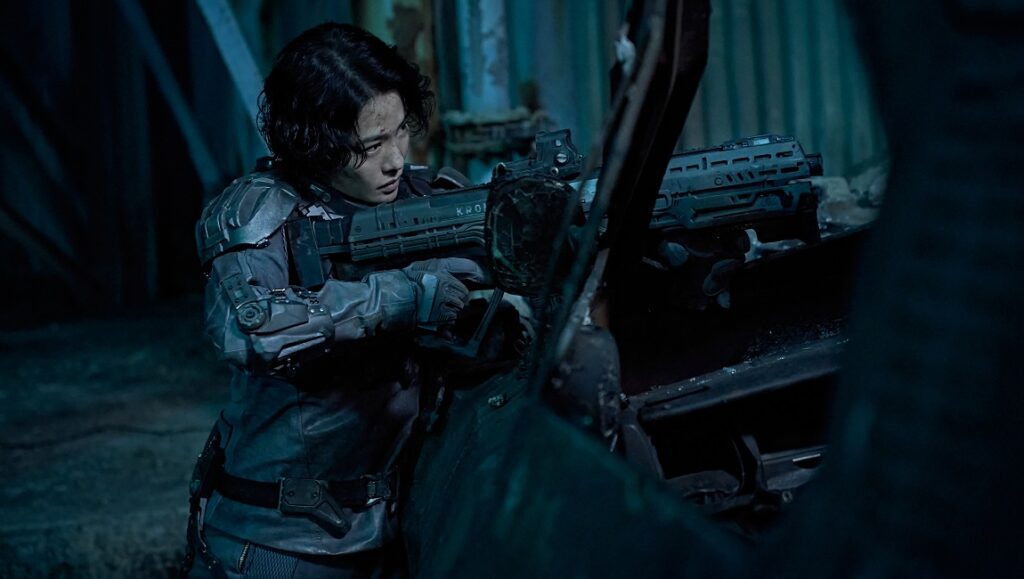There are brief glimpses of confounding breadth present in JUNG_E, most cogent when projected across the extensive digital dreamscape that is this world’s reality. Director Yeon Sang-ho — convening with his almost absurdist, certainly volatile, visions of bureaucratic observation — proposes here a fusion of post-apocalyptic and pop-utopian aesthetics, recalling, to a lesser extent, the beauty and comprehensive panache which elevates Mamoru Oshii’s Garm Wars: The Last Druid, a Japanese- Canadian co-production. But where Oshii utilizes artificiality to organize a sweeping exploration of the dissonance of live and digital textures, Yeon gropes about in an attempt to reconcile the central melodrama within the filmic world he has constructed.
JUNG_E, hosted on Netflix alongside the majority of Yeon’s recent work, conjures a late-late-capitalist military-technocracy to pillow the humble tale of a daughter’s guilt. Yoon Seo-hyun (Kang Soo-yeon, incisively erratic in her final performance) works in a weapons development company, contracted to provide Artificially Intelligent soldiers in order to fuel an ongoing Civil War. Her guiding ethical crisis, however, is that the AI utilized by the company is a reprint of her mother’s consciousness. The logistics of her professional position, as it is established across childhood flashbacks and in the present day, are, like any technical insights into the workflow of this company, flattened out and rendered increasingly contradictory over the course of the film. And so, what there is to help us through such an ungainly, contrived plot is the immediacy of this emotional schism, the moral dilemma of our protagonist who willfully clones her mother as a product in order to be close to her; to, ideally, develop the AI to such lengths that it will become fully autonomous and able to generate new memories. While the film flirts with concepts surrounding the intersections of agency, commodification, and their philosophical provocations, it hardly reaches the introspection of Alita: Battle Angel or Ghost in the Shell. In fact, the closest analog to this work would probably be that uncannily infectious Will Smith vehicle, I, Robot.
There are a slew of twists and turns, as well as tidbits of expositional world-building, that unceremoniously help to construct an unexpectedly humorous friction. Attaching such ornateness to the film’s plot design forces the viewer more often than not to confront perplexing intentionality, wherein a mash-up of genre — outwardly approaching the space opera, but never managing to fit the melodrama within its aesthetic ambitions comfortably — concocts tedious information flow. Terminal sickness, post-humanist racism, sex robots and toy tie-ins, fatalism, and the irrevocable love of a mother: these convoluted talking points, within which our characters reside, resemble the likes of a broken faucet whose water supply switch has popped off. In some regards, this chaotic collage of semiotics offers the only rightful base atop which we witness a total cognitive dissonance, sat squarely on the shoulders of our protagonist. It’s difficult to suspend disbelief in a character that so ignorantly perceives the world around them — built to be signifiers for us, yes, but ultimately signifiers which the protagonist must, too, as a part of their diegesis, interact with on the constant. Unless, perhaps, we are only to commit to these constructs, these characters, their materially elliptical existence, which is the very literalism art simply cannot be approached with. And so, at least, there must either be an attempt to cement logical continuity within the visible world of this narrative or, instead, invoke a seismic emotionality via a faithfulness to space opera aesthetics, which Yeon certifiably does not afford this work.
But when all is said and done, we have a character piece that’s abstracted to the exact degree the world around her is, both in diegetic convolution and thematic hodgepodge. The combination of this all evinces a lethargic impatience, the slippery narrative maneuverings yielding uncouth, largely facile merriments. Action is decently choreographed but egregiously composed, draining vitality from each set piece, which ultimately have the imagination to invigorate but lack the formal acuity to incite. And the film’s third act shifts into territory that can comfortably be summed up by the phrase, “I must now protect my humanoid, AI mom.” While that trajectory offers more coherent narrativity to express this enigma of capital affects, it is, just maybe, to the film’s benefit to be bordering instead on incoherence. For within this smokescreen of direction, there’s a palpability to Seo-hyun’s predicament, her own considerations of selfhood lost to the digital matrix of bureaucratic orchestration just like her mother’s. It is, in retrospect, less interesting to watch the unfurling of her guilt than it is to scrutinize the dissociation of her character as our only real vantage point into this world.
It’s fairly clear, then, that the spiraling faculties of JUNG_E are also its most provocative and successful. But it should be noted simultaneously that the facilitation of these facets proves cumbersome and monotonous: a stirring thought experiment, one might call it, or a genre exercise with blindfolds on. There’s a lot of fun to be had, but only after the viewer has recognized and moved past the narrative’s innate nebulousness, uncovering the realization that all the meat there is to chew on lies solely within an analysis that embraces the convolution as a signifier in its own right. The last shot, resembling some form of libertarian reactionary prescription, suggests reductive futurity, further elucidating the vague humanism this film’s equilibrium straddles. In it, we can rationalize the plain ideological indecision, the broad strokes of the film’s obvious moralism, which are, perhaps, the healthiest tools with which to confront this total conundrum.
You can currently stream Yeon Sang-ho’s JUNG_E on Netflix.
Published as part of InRO Weekly — Volume 1, Issue 3.


Comments are closed.